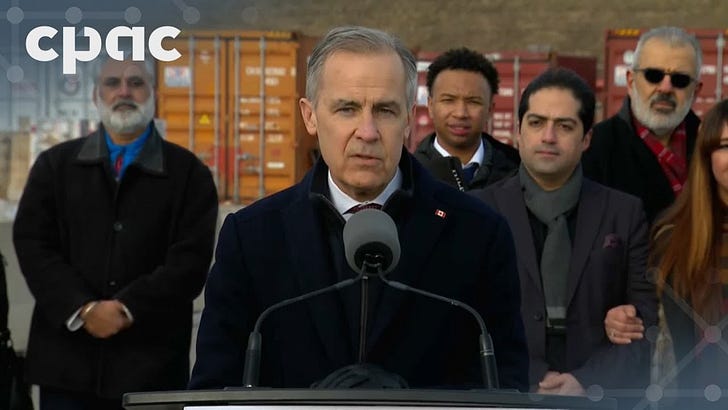Will the real Mark Carney please stand up?
He slices, he dices, and Bay Street insiders love him... just a little too much?

Central banker, finance bro... AND socio-economic transition macroeconomic savant.
Just how apolitical is a Central Bank Governor? Very. At least until everything got politicized.
According to always trustworthy Wikipedia, the “roles and responsibilities” of the Governor of the Bank of Canada consist of signing bank notes and subbing in for the Minister of Finance at IMF meetings. (I could also query chat gpt to extend this bit, but that would violate my oath to minimise exposure to the broligarchic idiocracy). Fair to assume there’s a bit more to it.
Let’s check in with the official Bank of Canada website to shed some light on just what their Governor does:
The Bank [of Canada]’s four main businesses are in the area of: monetary policy, currency, financial system and funds management. […] The Bank’s objectives are:
To contribute to the economic well-being of Canadians by:
conducting monetary policy in a way that fosters confidence in the value of money
promoting the safety and soundness of Canada's financial system
supplying bank notes that are readily accepted without concerns about counterfeiting
To provide efficient and effective central banking and debt-management services
To communicate the Bank’s objectives openly and effectively and to be accountable for its actions
It’s a bit clearer now. Mark Carney went from trading for Goldman Sachs in New York, London, Tokyo and… Toronto (bit of a downgrade there), to being recruited by the Bank of Canada and then ascending to the role of Governor from February 2008 to June 2013. Crucially, the Bank’s governor is not a political appointee – Carney was promoted by the Bank’s Board of Directors, and not by then Conservative Prime Minister Stephen Harper nor by then finance minister Jim Flaherty (though the deputy minister of finance does sit on the board of directors in a non-voting role).
Back to the Bank’s site:
As our Chief Executive Officer, the Governor ultimately has full control over the business of the Bank. The Governor:
chairs the Board of Directors
leads our Governing Council
conducts monetary policy to achieve an inflation target agreed upon by the Bank and the Government of Canada
There it is. The governor has one big lever – changing interest rates – which they use quarterly to encourage inflation to stay within a targeted range. So the elected government enacts their very political priorities through annual budgets (which are always confidence votes and must pass the House) and do affect inflation, including supply-side policies (Get your free $35B pipelines!), fiscal policies (tax breaks for the wealthy!), wage/price controls (Temporary Foreign Worker programme expansion anyone?). The central bank then assesses all of these politico-economic decisions in terms of the risk they pose on meeting the inflationary target set by the government, and, once every three months, signals to the market through an interest rate adjustment or non-adjustment.
So what risks to stable inflation did the Harper government pose? We might get a taste from the Tyee article, Harper, Serial Abuser of Power: The Evidence Compiled:
Against Court Order, Refusal to Share Budget Info
Even though it lost a court case and was ordered to comply, the Harper government nevertheless refused to share 170 times reasons and impacts for cuts with Canada’s independent budget watchdog, mocking Parliament’s right to control the public purse.
Undue Interference with Independent Agencies
Command and control system was extended to meddling in bodies like National Energy Board and CRTC whose arms-length autonomy is significantly reduced. A special target was the Parliamentary Budget Office, which was hit with condemnations and budget cuts for its critical reports.
Billions Borrowed without Parliament’s Permission
The auditor general sounded alarms about the “prodigious” growth and size of federal borrowing. Those billions in “non-budgetary” spending used to get Parliament’s oversight, but no more. The finance minister can borrow what he wants without Parliament’s permission. Why? A loophole buried in a 2007 Harper omnibus bill.
Given that Harper tried to lure Carney into politics with the offer of being Flaherty’s successor as Minister of Finance, none of Harper’s numerous financial scandals (such as his war against the Parliamentary Budget Office) warranted so much as a peep from Carney. None of them exceeded the risk threshold that would send the economy into a tailspin, so he remained silent. That was the job.
That certainly wasn’t the case for Carney’s next gig as the Governor of the Bank of England, when the looming threat of Brexit proved too great a risk to remain silent. The compromised, tax-haven loving British media establishment attempted to roast him for it, but Carney remained calm, steady and unbothered, taking none of their bait.
A beast of no nation
This all hints at the central dilemma now facing the Carney campaign in their attempts to paint Mark as a universal economic guru/saviour/market master for all seasons: It’s hard believe any such magical beast exists.
Carney identity #1
The proverbial "finance bro" who can be trusted with massive stacks of assets and manipulate short term market shifts to make bank for investors, society be damed (besides the odd splash of greenwashing).
Analysis: TRUE ✅ Brookfield anyone?
Carney identity #2
The serious and apolitical central bank governor who knows exactly when to pull that one big market-signalling interest rate lever to control inflation and maintain the "smooth sailing" status quo, regardless of financial shenanigans or longterm social damage.
Analysis: TRUE ✅ Harper-approved (then Harper-disapproved).
Carney identity #3
The central banker rockstar who can nudge the world’s financial behemoths to voluntarily stop financing fossil fuel development and walk away from all that filthy lucre for the sake of preserving life on this fragile planet of ours, as the UN Special Envoy on Climate Action and Finance.
Analysis: FALSE ⛔ Worth a shot, but that shot failed miserably.
Carney identity #4
The macro-economist visionary who can guide a national economy through a climate-energy transition and unprovoked trade war while minimising shocks, addressing socio-economic crises (housing, food, energy, transportation, etc), and preventing a homegrown coup by broligarch halfwits.
Analysis: INSUFFICIENT EVIDENCE ⛔ It’s mission impossible but Carney chose to accept it.
Will the real Mark Carney please stand up?
There’s no denying that Mark Carney is a very impressive, insanely hard-working, disciplined and smart individual. He’s living proof that with enough ambition, opportunism, discipline, and (crucially) moral compartmentalization, it just might be possible to transition through all four of these identities in a single lifetime. Has Carney? Well, to be frank, until he discloses his statement of assets and taxes, he's kind of stuck in finance bro mode. Why aren’t his personal finances already in a blind trust and in the public record? I’m sure his campaign director has a good reason that escapes the rest of us. And why does his campaign have him looking more like just another market-obsessed tax-cutting neoliberal ideologue on the daily?
There’s got to be a real Mark Carney in there somewhere. One that surely knows the importance of corporate regulation, curtailed greedflation, a healthy public sector, strong unions, and big, bold, public investments climate infrastructure. Could he stand up?
Liberals flip-flop on wealth tax for 1% gifts the NDP a huge opportunity
For almost a decade, the NDP have pressured the Liberals to implement a wealth tax to increase government revenue for social programmes. It’s popular with working Canadians, and progress seemed to finally be on the horizon last year. Now delays have turned into a total cancellation – just one more empty, unfulfilled promise from Trudeau’s Liberals.
Free advice to the Carney campaign:




